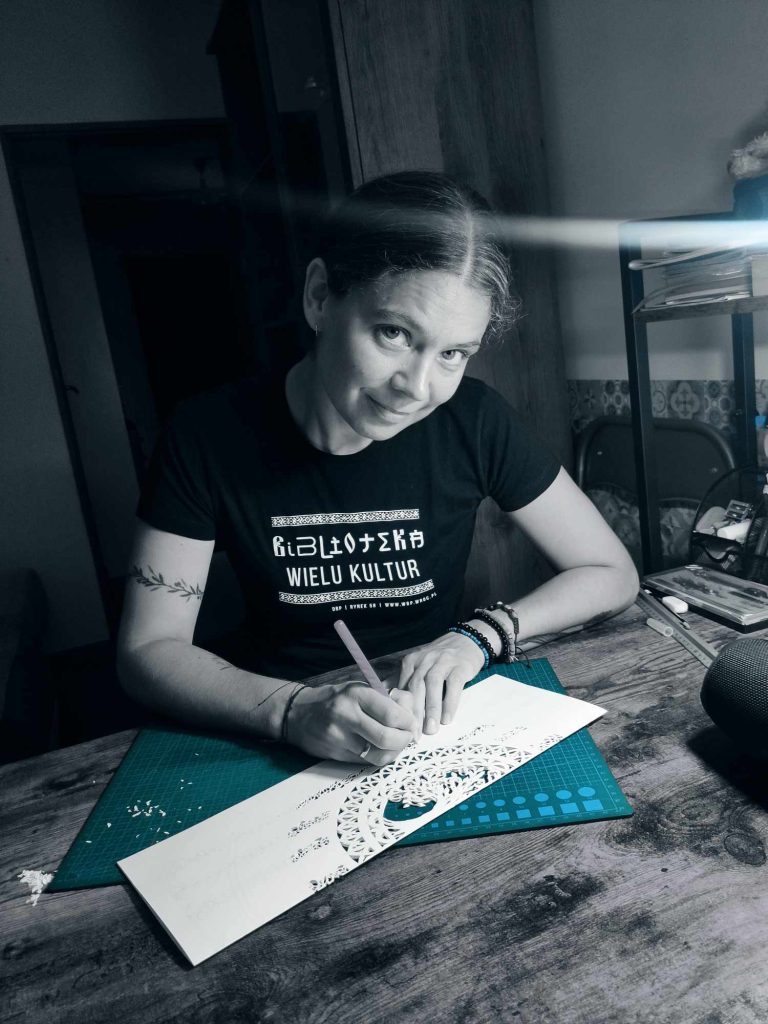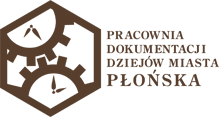On Friday, September 27 at 5:00 PM, we invite everyone to the Memorial House for the opening of our new temporary exhibition “(Non)traditional, (non)Jewish. Exhibition of Anka Wencel’s paper cuttings”.
A day later, on Saturday, September 28 at 12:00 PM, the author of the exhibition will lead special workshops on creating paper cuttings for young people and adults.
Both events announce this year’s 8th Festival of Jewish Culture in the city of Ben Gurion organized by the Municipal Cultural Center in Płońsk.
👉 Admission to the opening of the exhibition is free.
👉 Participation in the workshops is free of charge, the number of places is limited, registration is required by phone: 882 872 837 or e-mail: dompamieci@mckplonsk.pl
This is what the artist herself says about her work:
“Traditional Jewish cutting” is a term that often appears in descriptions of workshops and exhibitions by artists in Poland and abroad. But what does it actually mean? What makes a specific cutting “traditional” and what makes it possible to call it “Jewish”? Is it enough to be inspired by certain topics? Is it about using typical motifs and symbols from Jewish tradition in this work, reflecting a specific style so that both adjectives can appear in its description? Or maybe the Jewish origin of the author is an important issue?
That is why I have described my cutting somewhat perversely as (non)traditional and (non)Jewish, because they do not fully fit into known patterns and schemes, because I combine various motifs related to Jewish culture and Polish-Jewish history in them, because I look at the religious sphere from my own – completely non-religious – perspective.
Although I move in the area of Jewish tradition, culture, and history, which I know well because of my education, professional work and private contacts, I am aware that they are not and will not be completely “mine.” They are familiar and close, and yet – as a person outside the Jewish community – I do not identify with them fully. My view, full of admiration and respect for Jewish culture and art, remains an outsider’s view.
Anka Wencel – associated with the Education Department of the Galicia Jewish Museum since 2008, graduate of the Department of Jewish Studies at the Jagiellonian University. Coordinator of educational programs for recipients from Poland and abroad, including seminars for teachers “The Context of Teaching about the Holocaust” held since 2010. Author and co-author of exhibitions of the Galicia Jewish Museum, including: “Houses of Eternity. Jewish Cemeteries of Old Galicia” (2015), “Hungarian Lions of Judah in Galicia” (2018), “All Roads. Stories of Jews Saved from the Holocaust” (2014), “The Girl from the Diary. In Search of Rywka from the Łódź Ghetto” (2017), “HerStories – the Fate of European Jewish Women in the 20th Century” (2023), “We Have to Leave Something to the World… Beyond the Pages of Reni Spiegel’s Diary” (2024). Author and co-author of publications of the Galicia Jewish Museum: “Dreidel and Hamantashe – a Guide to Jewish Culture for the Youngest”, “On the Pages of a Calendar. Judaism and Jewish Tradition”, “Witnesses of Polish-Jewish History”. In 2018, she coordinated the publishing project “Janka Goldstein’s Diary”, which consisted of a critical study and publication of the diary written in occupied Kraków (1940-1942) by Janina Goldstein. Translator of books and exhibition catalogues, including “Traces of Memory. The Jewish Heritage of Polish Galicia”, “SWEET HOME SWEET. A story of salvation, memory and returns”. Co-author of the script for the film “Reni Spiegel’s Diary” (2023, dir. M. Kozioł, T. Głodek) and coordinator of educational activities related to the film. Anka Wencel is a guide at the Galicia Jewish Museum, conducts museum lessons, workshops and lectures on Jewish history and culture, the Holocaust, memory and protection of Jewish heritage. She is also involved in artistic activities, combining the traditions of Jewish and Polish folk cuttings in her works.


